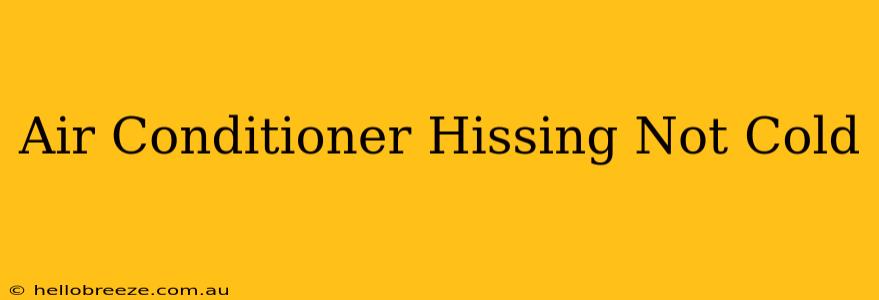Is your air conditioner hissing, but not blowing cold air? This is a serious problem that needs attention. A hissing sound often indicates a refrigerant leak, a critical component in your AC's cooling process. Ignoring this could lead to costly repairs or even complete system failure. This guide will help you understand the possible causes, what to look for, and when to call a professional.
Understanding the Hissing Sound in Your AC
That hissing sound is rarely a good sign. Refrigerant, the substance responsible for absorbing heat and cooling your home, operates under high pressure. A hissing noise typically signals a leak in the refrigerant lines, allowing this crucial substance to escape. Without sufficient refrigerant, your AC can't effectively cool your space, leading to warm air and increased energy bills.
Identifying the Source of the Hiss
Pinpointing the exact location of the hiss is the first step towards a solution. This might require some detective work:
- Listen Carefully: Move systematically around your AC unit, both indoors and outdoors, to pinpoint the source of the hissing.
- Visual Inspection (Caution!): Carefully inspect the refrigerant lines for any visible signs of damage, such as cracks, punctures, or loose connections. Be extremely cautious, as refrigerant lines operate under high pressure. Do not attempt repairs yourself.
- Check for Oil Stains: Refrigerant often carries oil. Look for oily stains near potential leak points.
Why Your AC is Not Cooling Even With a Hiss
A hissing sound alongside a lack of cool air almost always points towards refrigerant loss. Here's a breakdown:
- Low Refrigerant Levels: This is the most likely culprit. The hissing indicates the leak, and the low refrigerant means the system can't absorb enough heat to cool effectively.
- Compressor Issues: While a hissing sound usually points to a refrigerant leak, problems with the compressor (the heart of your AC) can also contribute to poor cooling and might be accompanied by other noises.
- Other Problems: Although less likely when paired with a hissing sound, other issues like clogged filters, frozen evaporator coils, or electrical malfunctions can also affect cooling capacity. These are less likely to produce a hissing sound on their own.
What to Do When Your AC is Hissing and Not Cooling
Do Not Attempt DIY Repairs: Refrigerant handling requires specialized equipment and expertise. Improper handling can be dangerous due to the high pressure involved and potential exposure to harmful chemicals.
Immediate Actions:
- Turn Off the AC: To prevent further refrigerant loss and potential damage, switch off your air conditioning unit immediately.
- Contact a Qualified Technician: Schedule a service appointment with a licensed HVAC technician. They have the necessary tools and knowledge to diagnose the problem accurately, repair the leak, and recharge the refrigerant system.
Preventing Future Hissing and Cooling Problems
Regular maintenance can significantly extend the life of your AC and prevent problems like refrigerant leaks:
- Annual Inspections: Schedule annual professional inspections to detect minor issues before they escalate into major problems.
- Clean Filters Regularly: Clogged filters restrict airflow, forcing the system to work harder and potentially leading to premature component failure.
- Protect Outdoor Unit: Keep the outdoor unit free from debris, leaves, and other obstructions.
Ignoring a hissing sound from your air conditioner is a risky proposition. Prompt professional attention will help restore your cooling system and prevent more significant, costly repairs down the line. Remember, safety first – always call a qualified HVAC technician for any issues related to refrigerant leaks.

